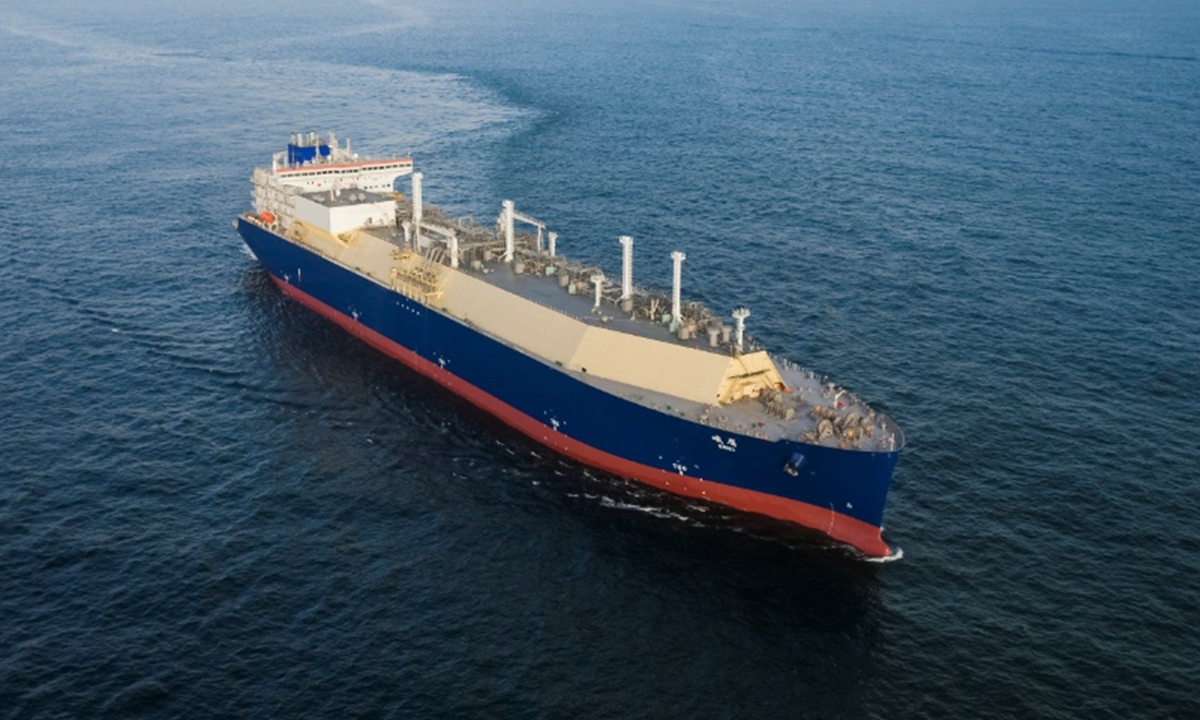
File Photo
While the US focuses on containing China's burgeoning shipbuilding industry, China is actively expanding its own capabilities and enhancing the quality and technology of its ships. This stark contrast underscores the futility of the US approach, which prioritizes suppression over self-improvement and stands little chance of stifling the rapid development momentum of China's shipbuilding sector.
A report released on Tuesday by the Center for Strategic and International Studies (CSIS) alleged that in only two decades, China has grown to be the dominant player in shipbuilding, claiming more than half of the world's commercial shipbuilding market, while the US share has fallen to just 0.1 percent, posing serious economic and national security challenges for the US and its allies.
This report comes against a specific backdrop. As reported by Reuters, the US is planning to charge fees for docking at US ports on any ship that is part of a fleet that includes Chinese-built or Chinese-flagged vessels, and it will push its allies to act similarly or face retaliation. But will such a narrow-minded and self-serving approach really be able to challenge China's position in the global shipbuilding market?
After analyzing the factors behind the rise of China's shipbuilding industry, most of the suggestions in this CSIS report center on how to curb China's market share in shipbuilding, rather than on how to enhance the competitiveness of the US itself. This may indicate the lack of both solutions to the lack of US industrial competitiveness and the absence of rational understanding about China's shipbuilding ascendancy.
Despite the CSIS' efforts to play up national security threats by over-emphasizing the impact of the so-called military-civilian integration on China's shipbuilding industry, the reality is that China's competitive edge in the global commercial shipbuilding market cannot be easily overturned by a single report or a few policies.
In 2024, China's shipbuilding completion volume accounted for 55.7 percent of the global total. New orders for China's shipbuilding industry accounted for 74.1 percent of global volume and orders on hand accounted for 63.1 percent.
What really deserves in-depth study is how the Chinese shipbuilding industry managed to achieve its remarkable rise in the first place. The reason why the US always begrudges the progress of China's shipbuilding industry is largely because it only sees the growth of China's share in the global market, while overlooking the massive efforts that China has painstakingly invested in this success. This skewed perception has led the US to solely focus on ways to curb the development of China's shipbuilding industry, rather than reflecting on and rectifying its own shortcomings in industrial competitiveness.
The progress of China's shipbuilding industry is based on a combination of technological innovation, industrial upgrading and market demand, rather than simple market share expansion.
The industry benefits from the government emphasis on high-end manufacturing. Through policy support, technology introduction and talent cultivation, a complete industrial chain has been gradually established.
Moreover, the rise of China's shipbuilding industry is also driven by technological innovation. Take liquefied natural gas (LNG) carriers as an example. South Korea had long taken most of the orders for LNG carriers. But in 2024, Hudong-Zhonghua Shipbuilding Co achieved a remarkable milestone by delivering the world's first fifth-generation large-scale LNG carrier and securing an order for 24 ultra-large LNG carriers from Qatar. This achievement clearly marks China's entry into the global first tier of this highly specialized and competitive sector, vividly showcasing its technological prowess and innovative capabilities in shipbuilding.
The growth of China's shipbuilding industry also stems from its astute insight into market demand. In 2024, China's new orders for green ships represented 78.5 percent of the global market. The development and delivery of eco-friendly vessels not only indicate the innovative capabilities of China's shipbuilding industry in environmental protection technology but also align perfectly with the global shipping industry's shift toward low-carbon and green vessels.
By comparison, the US is largely focused on identifying how China poses challenges and threats to its security. This misguided focus fails to address the deep-rooted problems facing the US shipbuilding industry and exacerbates its internal anxiety and fear. This perilous strategy threatens to disrupt the global logistics system and sow further uncertainty in the world economy. Perhaps it is time for the Americans to reflect on their misguided approach and stop going down this wrong path before it is too late.




